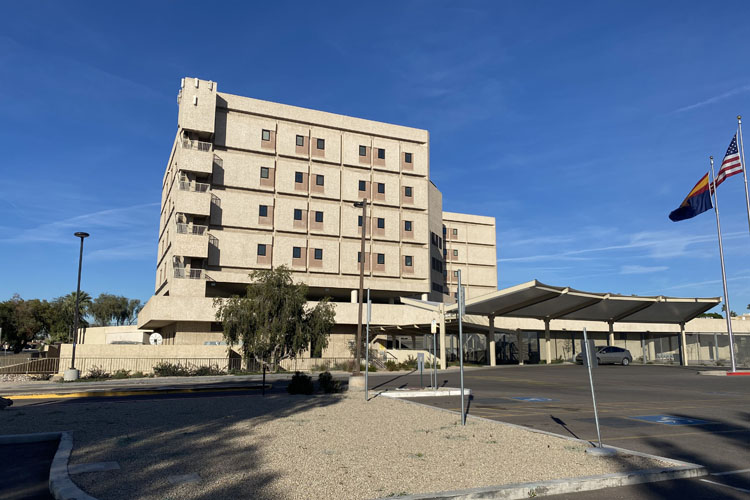Blankets are tucked tightly on the beds. The bathroom sinks wait for faucets to be turned on. And the floors gleam in rooms, ready for patients to show up in a new mental health treatment center in west Phoenix.
The center is in the former Maryvale Hospital, which shut down in 2017. Valleywise Health, the new owners and managers, opened an emergency room in April.
This month, more patients are expected at the newly dedicated Valleywise Behavioral Health Center, which will include up to 192 beds, turning it into a temporary home for those who need help.
“We’ve taken a hospital that was closed and converted it into a facility that will be addressing some of the most pressing needs that we have here in Maricopa County – the care of behavioral health patients and those who are seriously mentally ill,” said Steve Purves, CEO of Valleywise Health.
The treatment center helps relieve pent up demand for mental health services, said Gene Cavallo, senior vice president for Valleywise Health. Mentally ill people are underserved in Arizona, according to the nonprofit Mental Health America, which ranks the state 28th in access to mental health resources.
The new behavioral health center nearly doubles the number of beds Valleywise Health dedicates to the mentally ill – bringing the total to more than 400, Cavallo said.
In addition, he said, the emergency room, behavioral center and court will mean 300 to 400 jobs for the Maryvale neighborhood.
Most of the interior was renovated – a fourth-floor balcony is now a recreation room with a basketball hoop, foosball table and area to watch movies, said Valleywise Health executive assistant Camille Schake.
The old maternity ward now houses patient rooms, which have one or two beds. The rooms have no hooks, pictures or sharp objects that patients could use to hurt themselves or others. There’s nothing to tie cloth to or hang items.
But patients do have a window in each room to get a glimpse of the outside world. They get to see motorists drive by. They watch birds nest in trees. They get to see fellow patients in the courtyard.
Cavallo said patients can voluntarily admit themselves to the treatment center or come by court order. Some people may have talked about hurting themselves or others or act erratically. Two psychiatrists separately evaluate patients within 48 hours of arrival.
Elisa Donnadieu, a commissioner for Maricopa County Superior Court, then presides over a hearing in a courtroom on the premises. Witnesses and attorneys on both sides are called to get to the answer of an important question:
“Is this patient a threat to themselves or to anyone else?”
If the commissioner determines they are, patients will be committed to the center to receive inpatient treatment. If not, patients can leave with a family member or voluntarily admit themselves for treatment.
“Having the courtroom within the facility itself allows us to bring the patients right from the unit where they’re receiving care, down the elevator, into the courtroom and when it’s finished they can return,” Cavallo said. “It’s just better for everybody involved because it can all happen right here.”
A psychiatrist will determine when a patient is ready to be transitioned from the center to an outpatient treatment program. They reach out to psychiatrists, therapists and any other professionals to develop a plan for the patient.
Maryvale Hospital opened in 1961, six years after developer John F. Long started building a suburb, on the western edge of Phoenix and named it after his wife, Mary. Maryvale helped usher in the concept of master-planned, family-focused communities in Arizona.
“Maryvale was the westside hospital. You didn’t go anywhere else because there wasn’t anywhere else,” said Mary Rose Wilcox, a former Maricopa County supervisor and Phoenix City Council member who lived in Maryvale for three decades.
When the hospital was shuttered in 2017, about 140,000 people lived in Maryvale, according to the census. The nearest hospital was nearly 7 miles away.
A 2018 census document shows a neighborhood left behind – the median income was about $48,000 and 2 out of 10 people lived below the poverty line. Purves said most patients were on Medicaid or uninsured.
“There’s a number of residents here who don’t have access to a car,” Schake said, “and they would often walk to the hospital when they were in need. After the hospital closed, they weren’t able to get there.”
A hospital that once treated more than 40,000 patients a year stood empty for months.
“There was a time when this was literally an abandoned building,” Schake said.
Valleywise Health purchased the property in March 2018 with funds from voter-approved Proposition 480, which authorized $935 million for tax-supported health services. It costs more than $700 million to operate the facility annually, but Cavallo said Valleywise Health plans to expand.
Valleywise Health will open clinics in Peoria and south Phoenix later this year, and two others in Phoenix next year. They also plan to open a community health center just north of the behavioral health center in 2023.




